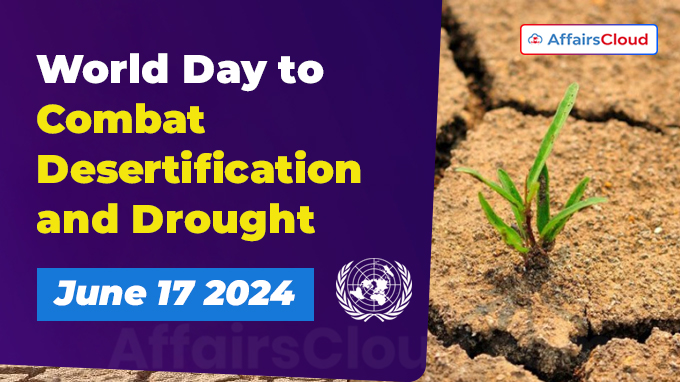 The United Nations (UN)’s World Day to Combat Desertification and Drought (WDCDD) is annually observed across the globe on 17 June to raise awareness and combat international issues linked to Desertification, Land Degradation, and Drought (DLDD).
The United Nations (UN)’s World Day to Combat Desertification and Drought (WDCDD) is annually observed across the globe on 17 June to raise awareness and combat international issues linked to Desertification, Land Degradation, and Drought (DLDD).
This Day showcases human-led solutions to prevent desertification and strengthen the implementation of the United Nations Convention to Combat Desertification (UNCCD), particularly in Africa.
- 17th June 2024 marks the 30th anniversary of the UNCCD, which was established on 17th June 1994.
Theme:
i.The 2024 theme of WDCDD is, “United for Land. Our Legacy. Our Future.”
ii.The 2024 theme highlights the transformative power of sustainable land management to ensure global stability and prosperity.
2024 Global Observance:
i.The global observance of the WDCDD 2024 was hosted by the Government of the Federal Republic of Germany, a signatory to the UNCCD.
ii.On 17th June 2024, a series of events were organised to mark the WDCDD 2024 and the –30th anniversary of UNCCD at the Bundeskunsthalle (Art and Exhibition Hall of the Federal Republic of Germany) in Bonn, Germany.
- The events were organised by the UNCCD, the German Federal Ministry of Economic Cooperation and Development (BMZ), and the City of Bonn.
Campaign:
Throughout May and June 2024, the UNCCD partnered with the BMZ and the City of Bonn, for the #UNited4Land public awareness campaign. As part of the campaign, they will be engaged in various events in and around Bonn on the future of land administration.
Background:
i.In 1994, the UN General Assembly (UNGA) adopted the resolution A/RES/49/115 proclaiming the 17 June of every year as the World Day to Combat Desertification and Drought.
ii.The 1st ever World Day to Combat Desertification and Drought was observed on 17 June 1995.
Points to Note:
i.UNCCD is the only legally binding international treaty on land management and drought and one of the 3 Rio Conventions alongside climate change and biodiversity.
iii.UNCCD is the driving force behind Sustainable Development Goal (SDG) 15, and Land Degradation Neutrality (LDN).
iii.Under UNCCD, over 130 countries have pledged to achieve LDN by 2030.
What is Desertification?
i.Desertification is the degradation of dryland ecosystems due to human activities and climate change.
ii.It involves unsustainable farming practices, overgrazing, deforestation, and soil erosion.
iii.Effects: Loss of biodiversity, soil infertility, increased vulnerability to natural disasters, displacement of populations, poverty, and socio-economic instability.
Note: Desertification may result in the displacement of some 50 million people within the next 10 years.
Key Facts:
i.Desertification affects global productivity, with 23% of the land now unproductive and 75% transformed for agriculture, accelerating faster than ever.
ii.DLDD is a critical environmental challenge, with up to 40% of the global land area already considered degraded.
- This degradation affects 3.2 billion people worldwide, particularly impacting rural communities and smallholder farmers who depend on land for their livelihoods.
iii.Of the world’s 8 billion inhabitants, over 1 billion young people (under 25 years)live in developing countries directly depend on land.
iv.Healthy land provides 95% of our food and 99% of human calorie intake relies on healthy land.
v.Every second, an equivalent of 4 football fields of healthy land are lost, totaling 100 million hectares annually.
vi.Restoring over 2 billion hectares of degraded land can benefit 1.3 billion people globally.
vii.An extra 593 million hectares of agricultural land (an area nearly twice the size of India), will be required to feed the global population that is projected to reach 10 billion by 2050.
viii.Investing in land restoration can yield significant economic returns, up to USD 30 for every dollar invested.
About the UN Convention to Combat Desertification UNCCD:
Executive Secretary– Ibrahim Thiaw
Headquarters– Bonn, Germany




